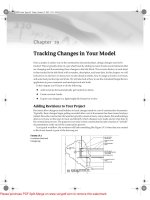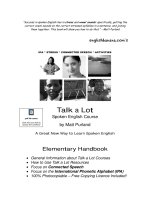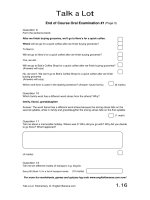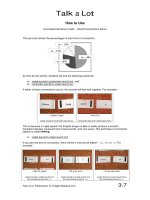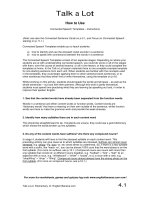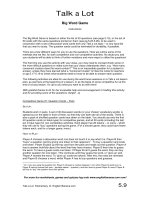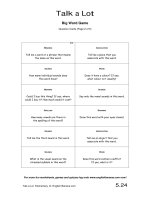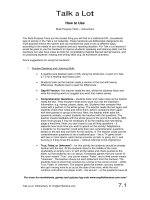Tài liệu Spoken english elementary handbook part 19 docx
Bạn đang xem bản rút gọn của tài liệu. Xem và tải ngay bản đầy đủ của tài liệu tại đây (148.32 KB, 15 trang )
Talk a Lot
Learn the International Phonetic Alphabet (IPA)
Spelling and Sounds – Common Vowel Clusters
For more fun worksheets, games and quizzes log onto www.englishbanana.com now!
Talk a Lot Elementary © English Banana.com
18.60
er L]L= = teacher, cleaner, hotter, mother ______________________
ier Lf]L= = tier, pier ______________________
ir L‰WL= = fir, bird, girl, whirl, twirl ______________________
oar LlWL= = oar, boar, hoar, hoard, board ______________________
oor LlWL= = door, floor, poor, moor ______________________
or LlWL= = form, nor, for, conform, port, sword __________________
our L~r]L= = our, flour, hour, dour, sour ______________________
ur L‰WL= = hurl, churl, unfurl, curl ______________________
4. Other Vowel Clusters with “r” (the consonant sound LêL is not pronounced)
v/cluster: sounds like: for example: my example(s):
are L^WL= = are ______________________
ere Lf]L= = here, mere ______________________
ere LÉ]L= = there, where ______________________
ere L‰WL= = were ______________________
ore LlWL= = more, before, core, store, lore ______________________
re L]L= = centre, metre, litre, acre ______________________
ure L]L= = brochure ______________________
5. Vowel Clusters with “w” (the consonant sound LïL is not pronounced)
v/cluster: sounds like: for example: my example(s):
aw LlWL= = paw, flaw, lawn, prawn, sawn ______________________
ew LìWL= = grew, brew ______________________
ow L]rL= = know, grow, snow, show, tow, bow, own ______________
ow L~rL= = bow, cow, now, how, brown ______________________
6. Vowel Clusters with “y” (the consonant sound LàL is not pronounced)
v/cluster: sounds like: for example: my example(s):
ay LÉfL= = pay, say, day, lay, May, play ______________________
ey LÉfL= = they, hey, prey ______________________
ey LáWL= = key, monkey, alley ______________________
oy LlfL= = toy, joy, annoy, employ, boy ______________________
7. Vowel Clusters with “gh” (the consonant sounds LÖL and LÜL are not pronounced)
v/cluster: sounds like: for example: my example(s):
augh LlWL= = caught, taught ______________________
eigh LÉfL= = weight, eight, weigh, neigh ______________________
Talk a Lot
Learn the International Phonetic Alphabet (IPA)
Spelling and Sounds – Common Vowel Clusters
For more fun worksheets, games and quizzes log onto www.englishbanana.com now!
Talk a Lot Elementary © English Banana.com
18.61
igh L~fL= = high, sigh, night, right, flight, might, bright ____________
ough LlWL= = bought, thought, ought, sought, nought ______________
ough LìWL= = through, throughout ______________________
8. Vowel Clusters with Other Consonant Letters (the consonant sounds are not pronounced)
v/cluster: sounds like: for example: my example(s):
oub L~rL= = doubt ______________________
eig LÉfL= = reign ______________________
al LlWL= = talk, walk, chalk, stalk ______________________
al L^WL= = half, calf, palm, calm, balm ______________________
ol L]rL= = yolk ______________________
oul LrL= = could, would, should ______________________
out LìWL= = ragout ______________________
Talk a Lot
Learn the International Phonetic Alphabet (IPA)
Spelling and Sounds – The Magic “e” Rule
For more fun worksheets, games and quizzes log onto www.englishbanana.com now!
Talk a Lot Elementary © English Banana.com
18.62
In one-syllable words that end with an “e”, the other vowel is almost always long and sounds
the same as it does in the alphabet. For example:
“a” in “made” sounds like: A LÉfL
“e” in “these” sounds like: E LáWL
“i” in “smile” sounds like: I L~fL
“o” in “phone” sounds like O L]rL
“u” in “huge” sounds like U LàìWL
This is known as the magic “e” rule. Note: the “e” is not pronounced – it is a silent letter. It
applies to each of the five vowel letters in written English, although there are more words for
“a”, “i”, and “o” than for “e” or “u”. With “u”, some of the words include the LàL consonant
sound, for example, “cute” LâàìWíL and “tube” LíàìWÄL , but some don’t, for example, “flume”
LÑäìWãL==and “rule” LêìWäL=.
Magic “e” words can be found in lots of different word groups, for example, there are nouns
(e.g. “face” and “bike”), verbs (e.g. “close” and “came”), adjectives (e.g. “cute” or “wide”), and
adverbs (e.g. “late”) in our list (see p.18.64). It is useful to know about the magic “e” rule when
studying pronunciation, because many common words follow these spelling/pronunciation
patterns.
There are some words that are exceptions to the rule (as we must expect in English), which
are important to remember, because some of them are very common words, for example:
are
awe
blue
bore
cheese
come
core
done
fore
give
give
gone
have
here
live (verb)
lose
love
move
none
one
please
pore
shone
some
sore
sure
there
vogue
were
wore
The magic “e” rule also applies in longer words that end with an “e”, for example “complete”
and “suppose”, but not in all longer words that end with an “e”, for example, in two-syllable
words that end with “-le”, like “little”, or that end with “-ce”, like “justice”.
Words with magic “e” are common in everyday English. If you read any short English text,
such as a newspaper article, an email, or a reading text in an English coursebook, you will be
sure to find some of them. Why not try it as an exercise and underline the ones that you find.
See p.18.64 for a list of 250 common English words that obey the magic “e” rule (in
alphabetical order), and the same list ordered by final consonant on p.18.65.
There are many word pairs which are fun to focus on, where the silent “e” changes a short
vowel sound to a long vowel sound, and a new word is created, for example:
Talk a Lot
Learn the International Phonetic Alphabet (IPA)
Spelling and Sounds – The Magic “e” Rule
For more fun worksheets, games and quizzes log onto www.englishbanana.com now!
Talk a Lot Elementary © English Banana.com
18.63
When the other vowel is “a”, the magic “e” changes the short sound LôL to the long sound LÉfL
bad bade
can cane
Dan Dane
fad fade
gal gale
hat hate
Jan Jane
mad made
man mane
mat mate
nap nape
pan pane
plan plane
sag sage
sham shame
stag stage
stat state
tat Tate
van vane
When the other vowel is “e”, the magic “e” changes the short sound LÉL to the long sound LáWL
met mete pet Pete
When the other vowel is “i”, the magic “e” changes the short sound LfL to the long sound L~fL
bid bide
bit bite
dim dime
din dine
fin fine
hid hide
kit kite
mit mite
pin pine
pip pipe
rid ride
shin shine
sit site
Tim time
win wine
writ write
When the other vowel is “o”, the magic “e” changes the short sound LflL to the long sound L]rL
cod code
con cone
cop cope
dot dote
hop hope
lob lobe
mod mode
mop mope
not note
rob robe
rod rode
wok woke
When the other vowel is “u”, the magic “e” changes the short sound L¾L to the long sound LàìWL=
cub cube hug huge tub tube
The rule for magic “e” words and suffixes is that if the suffix starts with a vowel letter, we lose
the magic “e” from the spelling. For example:
Suffix:
Examples:
• -ing (-ing forms) hope > hope -ing > hoping
• -ed (regular past forms) race > race -ed > raced
• -er (comparative forms) close > close -er > closer
• -est (superlative forms) tame > tame -est > tamest
• -en (verbs) wide > wide -en > widen
but, with suffixes that start with a consonant letter we keep the magic “e”, for example:
• -ly (adverbs) live > live -ly > lively
• -ful (adjectives) grate > grate -ful > grateful
• -ment (abstract nouns) amaze > amaze -ment > amazement
Talk a Lot
Learn the International Phonetic Alphabet (IPA)
Spelling and Sounds – 250 Common Magic “e” Words (in Alphabetical Order)
In one-syllable words that end with an “e”, the other vowel is almost always long and sounds the same as it does in
the alphabet. This is known as the magic “e” rule. Note: the “e” is not pronounced – it is a silent letter.
For more fun worksheets, games and quizzes log onto www.englishbanana.com now!
Talk a Lot Elementary © English Banana.com
18.64
a LÉfL
age
ape
bade
bale
behave
brace
brake
cage
cake
came
cane
cave
chase
contemplate
crate
craze
crusade
Dane
Dave
engage
escape
exhale
face
fade
fake
fame
fate
faze
forsake
frame
gale
game
gate
gave
gaze
grace
grate
grave
hale
hate
haze
inhale
Jane
Kate
knave
lace
lake
lame
lane
late
laze
lemonade
made
make
male
mane
mate
maze
nape
nave
pace
page
pale
pane
pave
plane
plate
race
rake
rave
sage
sale
same
sane
shade
shake
shame
Shane
shave
snake
space
stage
stake
stale
state
take
tale
tame
tape
Tate
template
trace
trade
vane
wake
whale
e LáWL
compete
complete
gene
mete
Pete
these
i L~fL
abide
arrive
beside
bide
bike
bite
brine
chide
chime
clime
Clive
compile
dime
dine
file
fine
five
hide
hike
hive
ice
ignite
Ike
jive
kite
knife
lice
life
like
lime
line
live
mice
Mike
mile
mine
mite
nice
nine
nite
pike
pile
pine
pipe
polite
pride
prime
prise
prize
provide
quite
ride
rile
rise
shine
side
site
size
smile
strife
sublime
tide
tile
time
trike
trite
twice
vice
while
white
wide
wife
wine
wise
write
o L]rL
atone
bloke
bone
broke
choke
chose
close
code
Coke
coke
cone
cope
dome
dote
drone
elope
explode
globe
hole
home
hone
hope
implode
joke
lobe
lode
mode
mole
mope
mote
node
nose
note
phone
poke
pole
probe
promote
robe
rode
rope
rose
smoke
sole
stoke
stole
stone
suppose
those
throne
tone
vote
whole
woke
wrote
u LàìWL=or LìWL
abuse
brute
chute
cube
cute
Danube
flume
fume
huge
legume
Luke
mule
puke
refuge
rule
tube
use
Yule
Talk a Lot
Learn the International Phonetic Alphabet (IPA)
Spelling and Sounds – 250 Common Magic “e” Words (Ordered by Final Consonant)
In one-syllable words that end with an “e”, the other vowel is almost always long and sounds the same as it does in
the alphabet. This is known as the magic “e” rule. Note: the “e” is not pronounced – it is a silent letter.
For more fun worksheets, games and quizzes log onto www.englishbanana.com now!
Talk a Lot Elementary © English Banana.com
18.65
a LÉfL
brace
face
grace
lace
pace
race
space
trace
bade
crusade
fade
lemonade
made
shade
trade
age
cage
engage
page
sage
stage
brake
cake
fake
forsake
lake
make
rake
shake
snake
stake
take
wake
bale
exhale
gale
hale
inhale
male
pale
sale
stale
tale
whale
came
fame
frame
game
lame
same
shame
tame
cane
Dane
Jane
lane
mane
pane
plane
sane
Shane
vane
ape
escape
nape
tape
chase
contemplate
crate
fate
gate
grate
hate
Kate
late
mate
plate
state
Tate
template
behave
cave
Dave
gave
grave
knave
nave
pave
rave
shave
craze
faze
gaze
haze
laze
maze
e LáWL
gene
these
compete
complete
mete
Pete
i L~fL
ice
lice
mice
nice
twice
vice
abide
beside
bide
chide
hide
pride
provide
ride
side
tide
wide
knife
life
strife
wife
bike
hike
Ike
like
Mike
pike
trike
compile
file
mile
pile
rile
smile
tile
while
chime
clime
dime
lime
prime
sublime
brine
dine
fine
line
mine
nine
pine
shine
time
wine
pipe
prise
rise
wise
bite
ignite
kite
mite
nite
polite
quite
site
trite
white
write
arrive
Clive
five
hive
jive
live
prize
size
o L]rL
globe
lobe
probe
robe
code
explode
implode
lode
mode
node
rode
bloke
broke
choke
Coke
coke
joke
poke
smoke
stoke
woke
hole
mole
pole
sole
stole
whole
dome
home
atone
bone
cone
drone
hone
phone
stone
throne
tone
cope
elope
hope
mope
rope
chose
close
nose
rose
suppose
those
dote
mote
note
promote
vote
wrote
u LàìWL=or LìWL
cube
Danube
tube
huge
refuge
Luke
puke
mule
rule
Yule
flume
fume
legume
abuse
use
brute
chute
cute
